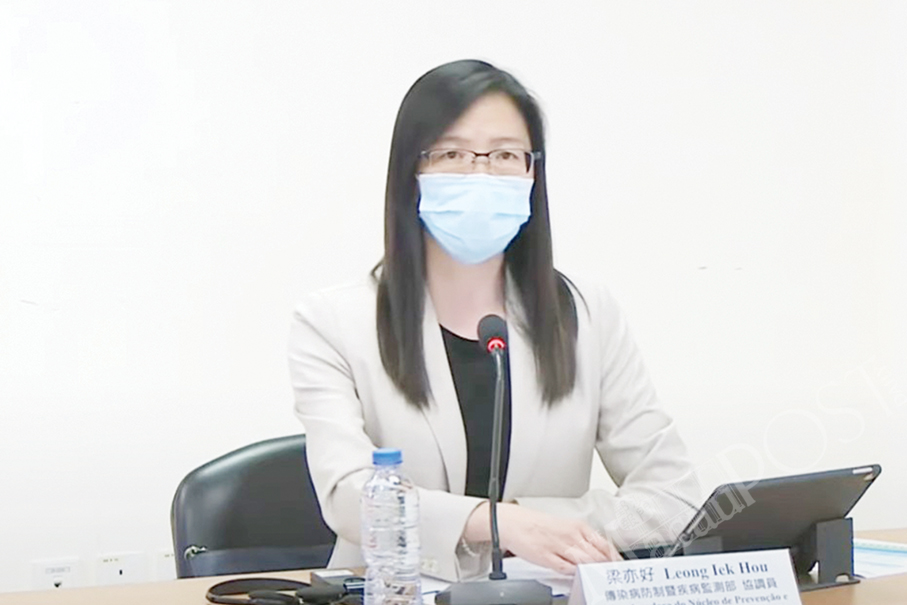Addressing yesterday’s press conference about Macau’s novel coronavirus situation, Health Bureau (SSM) Control of Communicable Diseases and Surveillance of Diseases Department Coordinator Leong Iek Hou said that as of yesterday afternoon the bureau had received 336 applications from non-resident foreigners (i.e., foreign nationals without a Macau ID card) claiming special circumstances for permission to enter Macau from Hong Kong, a new measure that started around the middle of last month.
According to Leong, the bureau has granted the special entry permits to 94 out of the 336 applicants.
According to the new measure – which was announced by Macau Health Bureau early last month, non-resident foreigners who have stayed in Hong Kong for at least 21 days prior to their intended arrival here can apply for a special permit to enter Macau. The measure comprises five groups of non-resident foreigners: 1) spouses, offspring or parents of Macau residents; 2) non-resident workers (informally known as “blue-card” holders) or those who have obtained an entry permit to work in Macau as a non-resident worker, and their accompanying family members who have obtained or are eligible to obtain a permit to stay in Macau; 3) those who have obtained a special permit to reside in Macau; 4) those who have been admitted to local higher education institutions; and 5) those visiting Macau for important commercial, academic or other professional activities.
Under the measure, applicants aged 12 or over must prove that they have been fully inoculated against COVID-19 with a vaccine recognised by the Hong Kong government or present a doctor’s certificate confirming that they are unable to get vaccinated against the novel coronavirus due to certain health reasons. Upon arrival in Macau, applicants who have been granted the special entry permit must present a nucleic acid test (NAT) certificate confirming a negative COVID-19 result, after which they must undergo 14 days of hotel quarantine – like all other arrivals from Hong Kong.
Leong said yesterday that the bureau had decided not to grant the special entry permits to 45 applicants due to their respective ineligibilities, while nine other applicants had cancelled their applications.
In addition, Leong said, the Health Bureau had refused to accept six applications which failed to meet the official requirements. Leong said that the bureau was still assessing all other applications out of the 336 which had been submitted as of yesterday afternoon.
Required jab rate keeps rising
Meanwhile, Leong admitted during yesterday’s press conference that the minimum vaccination rate of the population that would enable the local government to gradually ease its COVID-19 prevention and control measures was rising continuously due to the Delta variant. Leong said that as the novel coronavirus has been constantly mutating, particularly with the highly contagious Delta variant becoming increasingly dominant globally, COVID-19 vaccines have become less effective in preventing infection of the disease.
Consequently, Leong said, the Macau government, like various other countries and regions, will have to keep constantly “adjusting” the targeted inoculation rate that would make it possible for COVID-19 curbs to be gradually eased.
Therefore, Leong said, the more important purpose of getting vaccinated against COVID-19 nowadays was to reduce the risk of suffering a serious condition or dying from the novel coronavirus disease – in case jabbed people are still infected with COVID-19.
According to Leong, the World Health Organisation (WHO) has repeatedly underlined that while vaccinations are key to COVID-19 prevention and control, various other measures such as wearing a facemask and social distancing will have to remain in force.
Leong said that with a high COVID-19 vaccination rate in Macau, the local government could gradually ease COVID-19 travel curbs with certain neighbouring regions whose COVID-19 situation has been stable.
Leong also said that Macau’s COVID-19 vaccination rate had reached around 67 percent as of yesterday afternoon – i.e., about two thirds of the population has received at least one jab. According to the latest demographic statistics, Macau’s population stood at 682,500 at the end of June.
Leong told reporters early this month that only after Macau reaches a COVID-19 vaccination rate of 80 to 90 percent, could the local government consider shifting its zero-COVID policy to the “living with the virus” approach. Leong said early this month that jurisdictions that have started to adopt the strategy to live with the novel coronavirus normally have a high COVID-19 inoculation rate of 80 to 90 percent, and in particular their vaccination rates among senior citizens and those with a chronic disease are even higher.
Replying to media questions, Leong admitted yesterday that she could not predict when Macau would reach a COVID-19 vaccination rate of at least 80 percent, as residents getting vaccinated against the novel coronavirus was their own decision. Leong said that what the Health Bureau could do in order to increase the city’s inoculation rate was to roll out more measures that would make it more convenient for residents to receive their COVID-19 jabs and to strengthen its awareness campaigns about the importance of getting vaccinated against COVID-19.
Low jab rates among teenagers & seniors
Leong also reaffirmed that while Macau’s COVID-19 vaccination rates among young and middle-aged people are high, the inoculation rates among those aged between 12 and 19 and those aged 60 or over are still relatively low.
Leong underlined that while the Health Bureau will continue its cooperation with the Education and Youth Development Bureau (DSEDJ) and community associations with the aim of boosting COVID-19 vaccinations among students and senior citizens, “having a favourable social atmosphere” was even more important for increasing their inoculation rates, because of which, Leong said, young and middle-aged residents should convey the message to their family members who are senior citizens or those with a chronic disease about the importance of getting inoculated against COVID-19.
Leong also reaffirmed that senior citizens who have been infected with COVID-19 will run the risk of suffering a serious condition 60 to 100 times more than young people who have caught the novel coronavirus. In case of a COVID-19 infection, according to Leong, senior citizens who have not been inoculated against the novel coronavirus will run the risk of suffering a serious condition nine times more than their peers who have been vaccinated against COVID-19.
Education sector’s jab rate
Meanwhile, Wong Ka Ki, who heads the Non-Tertiary Education Department of the Education and Youth Development Bureau (DESDJ), said during yesterday’s press conference that the COVID-19 vaccination rate among teaching staff in both the non-tertiary and higher education sectors has reached 85 percent, while the inoculation rates among higher education students and non-tertiary education students have reached 80 percent and 46 percent respectively.
According to Wong, over 70 schools have joined the government’s outreach COVID-19 vaccination programme.
Meanwhile, from next week the Novel Coronavirus Response and Coordination Centre will reschedule its regular press conferences to every Thursday only, a change from the hitherto two press conferences per week, every Monday and Thursday.

Health Bureau (SSM) Control of Communicable Diseases and Surveillance of Diseases Department Coordinator Leong Iek Hou addresses yesterday’s press conference about the city’s novel coronavirus situation. Photo: GCS









